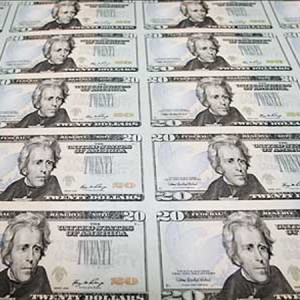TOKYO — The dollar was mixed in Asia Tuesday as investors await the end of a two-day Federal Reserve policy meeting for clues about the bank’s plans for its stimulus program.
The greenback bought 97.56 yen in Tokyo afternoon trade, from 97.66 yen in New York on Monday, while the euro slipped to $1.3777 from $1.3787 and 134.40 yen from 134.67 yen.
“Amid a lack of cues and with the (Fed meeting) coming up, the dollar hasn’t been able to find strong direction,” Masafumi Yamamoto, forex strategist at Praevidentia Strategy in Tokyo, told Dow Jones Newswires.
While analysts widely expect the Fed to keep its $85 billion a month asset-buying scheme in place they will be poring over Wednesday’s announcement for clues as to when it will start winding it down.
The bank had been expected to begin tapering by the end of this year but a weak set of data, including soft jobs growth, and this month’s two-week government shutdown has made that highly unlikely.
Fed officials say they will only begin reeling in the scheme when the economy is strong enough.
The likelihood of the wind-down being put off increased on Monday, with an uneven set of economic figures out of Washington.
“US data was mixed, with headline September industrial production beating expectations but manufacturing production came in soft while pending home sales registered a surprisingly sharp fall over the same month,” Credit Agricole said.
“The data did little to discourage those expecting the Fed to taper later rather than sooner and this is likely to be echoed by US retail sales data (Tuesday).”
The Bank of Japan (BoJ) will also hold a two-day policy meeting this week and investors will be looking to see if it will add to its own vast stimulus drive aimed at ending years of deflation and kickstart economic growth.
An expansion of the scheme would likely put downward pressure on the yen.
“While the Bank of Japan is unlikely to act this week on policy, the risks of further action will only increase over the coming months as it becomes apparent that reaching and sticking to its 2.0 percent inflation target will not be possible given current settings,” it added.
“In turn, the yen is set for further downward pressure.”
The dollar was mixed against other Asia-Pacific currencies.
It rose to Sg$1.2385 from Sg$1.2363 the previous day, to Tw$29.41 from Tw$29.40 and to 43.14 Philippine pesos from 43.04 pesos.
The greenback also strengthened to 61.70 Indian rupees from 61.51 and to 11,100 Indonesian rupiah from 11,023 rupiah.
It slipped to 31.06 Thai baht from 31.07 baht, to 1,060.72 South Korean won from 1,061.05 won.
The Australian dollar edged down to 95.07 US cents from 96.03 cents, while the Chinese yuan inched up to 16.03 yen from 16.02 yen.
